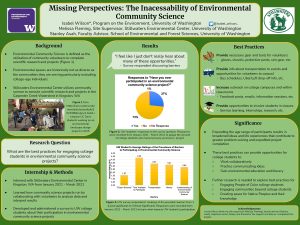Missing Perspectives: The Inaccessability of Environmental Community Science
Despite environmental issues impacting everyone, environmental community science is not very diverse, typically accommodating older folks with the time and money to participate. My research project explored best practices to engage college students in environmental community science projects. The lack of college student participation results in a lack of diverse voices, projects taking longer to complete, and college students missing hands-on experience. I interned at Stillwaters Environmental Center which utilizes community science by conducting scientific research with the help of volunteers and participated in a community science bird monitoring project by organizing and analyzing data while thoroughly learning about how these projects function. I then created and sent out a survey to the UW students to gauge the barriers they experience when attempting to participate in these projects. My results show that there are many diverse impacts of barriers to college students. Time available is the biggest barrier followed by money and transportation. Increased outreach to spaces including college students will also create more opportunities for their participation by spreading awareness of organizations and issues to participate in. In addition, initiatives and programs to increase accessibility should be developed. By implementing my suggested solutions, more students can and will begin participating in environmental community science, which will increase the quantity and breadth of ideas contributed and decrease the time it takes to complete projects. College students will also increase their environmental literacy as they gain hands-on experience, increase their connection to their environment, and gain confidence to continue volunteering.
